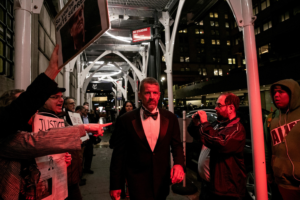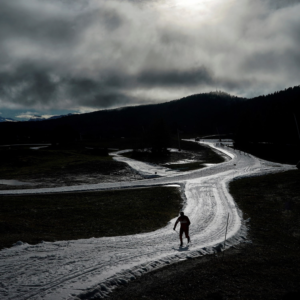Civil rights lawyer laments dismissal of suit which attempted to force city to make recompense for the destruction of Black area
An Oklahoma judge has thrown out a lawsuit seeking reparations for the 1921 Tulsa race massacre, dashing an effort to obtain some measure of legal justice for elderly survivors.
The judge, Caroline Wall, on Friday dismissed with prejudice the lawsuit which attempted to force the city and others to make recompense for the destruction of Greenwood, a once-thriving Black district.
The case involved three survivors of the attack, all now over 100 years old and who sued in 2020, in the hope of seeing what their attorney called “justice in their lifetime”.
Spokespeople for the city and a lawyer for the survivors – Lessie Benningfield Randle, Viola Fletcher and Hughes Van Ellis – did not immediately comment.
Wall, a Tulsa county district court judge, wrote in a brief order that she was tossing the case based on arguments from the city, the regional chamber of commerce and other state and local government agencies. Last year, she ruled against the defendants’ motions to dismiss and allowed the case to proceed.
Judicial elections in Oklahoma are technically nonpartisan but Wall has described herself as a “constitutional conservative” in campaign questionnaires.
The lawsuit was brought under Oklahoma’s public nuisance law, which in 2019 was used by the state attorney general to force the drug maker Johnson & Johnson to pay $465m in damages over the opioids epidemic. The Oklahoma supreme court overturned that decision two years later.
The Tulsa race massacre suit said the actions of the white mob that killed hundreds of Black residents and destroyed what had been the most prosperous Black business district in the US continue to affect the city today.
It contended that Tulsa’s long history of racial division and tension stemmed from the massacre, during which a mob descended on a 35-block area, looting, killing and burning. Thousands were left homeless, living in a hastily constructed camp.
The city and insurance companies never compensated victims and the massacre ultimately resulted in racial and economic disparities that still exist today, the lawsuit argued. It sought a detailed accounting of property and wealth lost or stolen, the construction of a hospital and the creation of a compensation fund, among other measures.
A chamber of commerce attorney previously said the massacre was horrible but the nuisance it caused was not ongoing.
Fletcher, at 109 the oldest living survivor, is set to release a memoir next month.
Responding to Judge Wall’s decision, the renowned civil rights attorney Ben Crump lamented a “sad miscarriage of justice”.
Bishop Talbert Swan, of the Vermont Ecclesiastical Jurisdiction, said: “America has $70bn for Ukrainians in conflict with Russians but $0 for Black people murdered, brutalized and dehumanized by white Americans.”
The lawsuit dismissal came a day after Ryan Walters, Oklahoma’s Republican superintendent of public instruction, said teachers should not “say that the skin color determined” what happened in the Tulsa race massacre.
Walters, who has advocated against the teaching of racism in US history, wasasked at a public forum in Norman, Oklahoma, how the massacre could “not fall” under his interpretation of critical race theory – an academic discipline that examines the ways in which racism operates in US laws and society, which Republicans across the US have turned into a profitable political bugbear.
Walters said: “I would never tell a kid that because of your race, because of your color of your skin, or your gender or anything like that, you are less of a person or are inherently racist.
“That doesn’t mean you don’t judge the actions of individuals. Oh, you can, absolutely. Historically, you should: ‘This was right. This was wrong. They did this for this reason.’
“But to say it was inherent in that … because of their skin is where I say that is critical race theory. You’re saying that race defines a person. I reject that.
“So I would say you be judgmental of the issue, of the action, of the content, of the character of the individual, absolutely. But let’s not tie it to the skin color and say that the skin color determined it.”
According to the Oklahoma Historical Society, the Tulsa race massacre is “believed to be the single worst incident of racial violence in American history”.
I hope you appreciated this article. Before you move on, I was hoping you would consider taking the step of supporting the Guardian’s journalism.
From Elon Musk to Rupert Murdoch, a small number of billionaire owners have a powerful hold on so much of the information that reaches the public about what’s happening in the world. The Guardian is different. We have no billionaire owner or shareholders to consider. Our journalism is produced to serve the public interest – not profit motives.
And we avoid the trap that befalls much US media – the tendency, born of a desire to please all sides, to engage in false equivalence in the name of neutrality. While fairness guides everything we do, we know there is a right and a wrong position in the fight against racism and for reproductive justice. When we report on issues like the climate crisis, we’re not afraid to name who is responsible. And as a global news organization, we’re able to provide a fresh, outsider perspective on US politics – one so often missing from the insular American media bubble.
Around the world, readers can access the Guardian’s paywall-free journalism because of our unique reader-supported model. That’s because of people like you. Our readers keep us independent, beholden to no outside influence and accessible to everyone – whether they can afford to pay for news, or not.
If you can, please consider supporting us just once from $1, or better yet, support us every month with a little more. Thank you.
Betsy Reed
Editor, Guardian US




